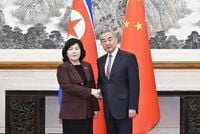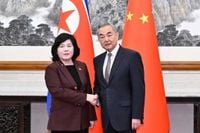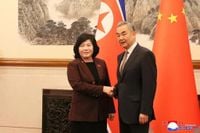In a week marked by high-level diplomatic exchanges and carefully worded statements, the foreign ministers of North Korea and China have pledged to deepen their bilateral relationship and jointly resist what they call "hegemonism" and "unilateralism"—terms widely interpreted as veiled references to the United States and its allies. The meeting, held in Beijing on September 28 and 29, 2025, comes at a time of shifting alliances and mounting geopolitical tension in East Asia, with both nations seeking to reaffirm their strategic partnership on the global stage.
According to reports from the Korean Central News Agency (KCNA) and China’s Xinhua News Agency, North Korean Foreign Minister Choe Son Hui met with her Chinese counterpart, Wang Yi, for their first one-on-one talks since Choe took office in June 2022. The two diplomats reached what KCNA described as a "complete consensus" on a host of regional and international issues, with both sides emphasizing the need to "boost strategic communications and exchanges." Wang Yi stressed, "China is ready to strengthen coordination and cooperation with the DPRK in international and regional affairs, oppose all forms of hegemonism, and safeguard the common interests of both sides and international fairness and justice."
Choe, for her part, delivered a message from North Korean leader Kim Jong Un, who said, "the friendship between North Korea and China remains unchangeable" and that "further strengthening ties between Beijing and Pyongyang was the North's unwavering position." Choe stated that North Korea is "willing to closely cooperate with China in multilateral affairs, jointly resist unilateralism and power politics, and promote a fairer and more just world order," echoing sentiments that have become increasingly common in official statements from both capitals.
The timing of the meeting is notable. Just three weeks prior, Kim Jong Un and Chinese President Xi Jinping held their first summit in over six years, pledging mutual support and enhanced cooperation. The summit was held on the sidelines of a massive military parade in Beijing commemorating the 80th anniversary of the end of World War II—a spectacle that also featured Russian President Vladimir Putin. It was the first time Kim had attended a major multilateral event during his 14-year rule, signaling a potential shift in North Korea’s international engagement strategy.
The joint appearance of Kim, Xi, and Putin at the parade drew global attention, with analysts suggesting it displayed a potential three-way unity against the United States. However, questions remain about how far China is willing to go in a formal anti-U.S. partnership, given its complex economic and strategic interests. Still, the optics of the event and the subsequent diplomatic flurry have not gone unnoticed in Washington, Seoul, and Tokyo.
China’s position was further clarified during Choe’s meeting with Premier Li Qiang on September 29. According to KCNA, Li described the North Korea-China partnership as being "solidified and advanced under the direct attention and strategic guidance" of Kim and Xi. He added that it is China’s "unwavering foreign policy stance to always promote the development of bilateral relations from a strategic angle and a long-term perspective." Li expressed willingness to "strengthen exchanges, cooperation and strategic communications with Pyongyang to help bring greater welfare to both their peoples."
Choe’s four-day trip to China, which concluded with her departure from Beijing on September 30, has been interpreted by South Korean officials as an effort to coordinate responses with China ahead of the upcoming Asia-Pacific Economic Cooperation (APEC) summit in Gyeongju. President Xi is scheduled to hold summits with South Korean President Lee Jae Myung and former U.S. President Donald Trump during the event. According to an official at South Korea’s unification ministry, "Choe is assumed to have traveled to China for prior communications, as President Xi is scheduled to hold summits with South Korea and the U.S. during his trip to South Korea for the APEC summit." There is speculation that North Korea requested any mention of its denuclearization be excluded from Xi’s summit statements, though no official confirmation has been provided.
Both North Korea and China have strong motivations for reaffirming their partnership. North Korea, having focused in recent years on expanding cooperation with Russia—including supplying combat troops and ammunition for the war in Ukraine—now appears keen to strengthen its ties with China as the conflict in Ukraine approaches an uncertain end. China, for its part, is eager to maintain influence over North Korea, especially after reports of cooled relations during Pyongyang’s pivot toward Moscow.
The United States remains the elephant in the room. As UPI notes, Wang Yi’s comments about "power politics and bullying acts" in the current international landscape are widely seen as criticisms of the U.S., which is locked in ongoing economic and strategic competition with China. Meanwhile, North Korea continues to justify its nuclear weapons program as a necessary deterrent against what it calls "hostile, hegemonic power" from Washington and its allies, namely South Korea and Japan. The U.S. has consistently demanded North Korea’s denuclearization, a demand Pyongyang has repeatedly rebuffed.
Interest is now swirling around the upcoming 80th anniversary of the founding of North Korea’s ruling Workers’ Party on October 10. Satellite imagery analyzed by SI Analytics suggests that North Korea is preparing for its largest-ever military parade to mark the occasion, with new weapons—including the Hwasong-20 intercontinental ballistic missile, cruise missiles, tanks, and AI-enabled attack drones—likely to be unveiled. Russia has already announced that its second-in-command, Dmitry Medvedev, will attend. The makeup of the Chinese delegation remains a subject of speculation, with some observers wondering whether Xi Jinping himself will make his first visit to North Korea since 2019. However, as South Korean officials point out, China has no record of its top leader visiting North Korea on the anniversary, and another summit between Kim and Xi so soon after their recent meeting in Beijing appears unlikely.
Choe’s visit also included discussions of North Korea’s domestic agenda. She reportedly outlined her country’s economic efforts to complete projects in the final year of its five-year economic development plan and wished the Chinese people success in their "struggle for national rejuvenation under Xi." These statements underscore the blend of pragmatism and symbolism that often characterizes North Korea-China relations.
As the world watches the evolving dynamics between Pyongyang, Beijing, and Moscow, the latest round of diplomatic activity highlights the enduring importance of the North Korea-China relationship. While the rhetoric is familiar, the context is anything but static. With major regional summits and military displays on the horizon, the coming weeks may offer fresh clues about the direction of this complex—and consequential—partnership.






